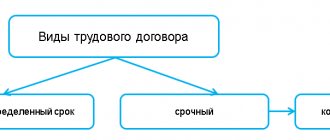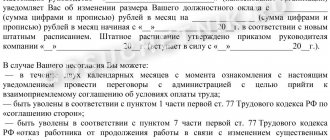Dismissal
The general procedure and conditions for terminating an employment contract on the initiative of an employee (at his own request) are established by Article 80 of the Labor Code of the Russian Federation (hereinafter referred to as the Labor Code of the Russian Federation).
According to this article and paragraph 3 of part 1 of Article 77 of the Labor Code of the Russian Federation, an employee can at any time, on his own initiative, terminate the employment contract he has concluded. In this case, in general, the employee is obliged to notify the employer of his dismissal in writing no later than 2 weeks in advance. Note that the specified period begins the next day after the employer receives the employee’s resignation letter (for example, if the application was submitted by the employee on October 1, 2019, then the notice period begins on November 2 and lasts until November 16). If the last day of the period falls on a non-working day, then the end of the period is considered to be the next working day.
The letter of Rostrud dated 06/05/2006 No. 1551-6 explains that an employee can notify the employer about dismissal not only during the period of work, but also while on vacation or sick leave. In this case, the date of the proposed dismissal may also fall within the specified periods. Based on Part 3 of Article 14 of the Labor Code of the Russian Federation, the employee’s time of illness or vacation does not interrupt the period of notice of dismissal.
When dismissing on the initiative of an employee (at his own request), the presence of his application is mandatory, otherwise it will be very difficult to prove that the dismissal really corresponds to the will of the employee. This is confirmed by law enforcement practice, as evidenced, for example, by the Decision of the Moscow Regional Court dated April 17, 2012 in case No. 33-8923.
By agreement between the employee and the employer, the employment contract can be terminated before the expiration of the notice period for dismissal (Article 80 of the Labor Code of the Russian Federation). In addition, to dismiss an employee without so-called work off, the employer:
- maybe for a good reason. For example, when an employee enrolls for study, in connection with conscription into the army, retirement, and so on. This follows from Part 3 of Article 80 of the Labor Code of the Russian Federation and is confirmed by paragraph 22 of the Resolution of the Plenum of the Supreme Court of the Russian Federation dated March 17, 2004 No. 2 “On the application by the courts of the Russian Federation of the Labor Code of the Russian Federation”;
- obliged in cases of established violation by the employer of labor legislation and other regulatory legal acts containing labor law norms, local regulations, conditions of a collective agreement, agreement or employment contract. Please note that in these cases the employer is obliged to terminate the employment contract within the period specified in the employee’s application. In particular, if there is a delay in payment of wages, the employer is obliged to satisfy the employee’s request for dismissal at his own request without any work off.
For some categories of employees who resign of their own free will, special notice periods have been established for the employer to notify the employer of dismissal. In particular, this applies to:
- employees resigning during the probationary period, who are required to notify the employer no later than 3 days before dismissal (Article 71 of the Labor Code of the Russian Federation);
- resigning heads of organizations for which such a period, on the basis of Article 280 of the Labor Code of the Russian Federation, is at least a month;
- for employees with whom fixed-term employment contracts are concluded for a period of less than 2 months. By virtue of Part 1 of Article 292 of the Labor Code of the Russian Federation, they are obliged to notify of dismissal 3 calendar days before their dismissal;
- seasonal workers, whose notice period is also 3 calendar days (Part 1 of Article 296 of the Labor Code of the Russian Federation).
In case of refusal to transfer to another job and dismissal for medical reasons
Article 178 of the Labor Code of the Russian Federation obliges the payment of benefits in the amount of two weeks' earnings if an employee is dismissed due to deteriorating health - he cannot perform his previous functions, according to a medical report. It should be remembered that before terminating the employment contract, the employee must be offered other vacancies that are suitable for him due to health reasons.
Thus, payments to an employee upon dismissal for medical reasons consist of:
- salaries;
- vacation compensation;
- severance pay.
How to count vacation
Upon termination of an employment contract, the employer is obliged to pay all amounts due to him and not disputed by him on the day of dismissal of the employee.
If the employee did not work on the day of dismissal, then the corresponding amounts must be paid no later than the next day after the dismissed employee submits a request for payment (Article 140 of the Labor Code of the Russian Federation). Such amounts traditionally include wages due and compensation for unused vacation (if the employee has unused vacation days at the time of dismissal). Let us recall that compensations are monetary payments established to reimburse employees for costs associated with the performance of their labor or other duties provided for by the Labor Code of the Russian Federation and other federal laws (Article 164 of the Labor Code of the Russian Federation).
To determine the amount of monetary compensation for unused vacation, it is necessary to calculate the number of vacation days for which compensation is paid and the employee’s average daily earnings. Vacation to be replaced by monetary compensation upon dismissal of an employee is calculated on the basis that full vacation is due to an employee who has worked a full year. Based on Article 122 of the Labor Code of the Russian Federation, paid leave must be provided to the employee annually, that is, in every working year.
The working year is 12 full months and, unlike the calendar year, is calculated not from January 1, but from the day the employee starts working for a specific employer.
This rule was laid down in the Rules on regular and additional holidays, approved by the People's Commissariat of Labor of the USSR dated April 30, 1930 No. 169 (hereinafter referred to as the Rules), currently in force to the extent that does not contradict the Labor Code of the Russian Federation.
These clarifications are given in Letter of the Ministry of Labor of Russia dated October 25, 2018 No. 14-2/OOG-8519. Paragraphs 28 and 29 of the rules establish the principle of proportionality in the payment of compensation for unused vacation days upon dismissal in the event that the working year has not been fully worked out. Since this rule is not directly established in Article 127 of the Labor Code of the Russian Federation, one should be guided by these rules, taking into account Article 423 of the Labor Code of the Russian Federation regarding the need for proportionality in the payment of compensation.
If the working year is not fully worked, the vacation days for which compensation must be paid are calculated in proportion to the months worked. That is, if the duration of paid leave is 28 calendar days, then for each month of the working year there are 2.33 calendar days of leave (28 calendar days / 12 months) . In this case, surpluses amounting to less than half a month are excluded from the calculation, and surpluses amounting to more than half a month are rounded up to a full month (clause 35 of the rules, Letter of Rostrud dated December 18, 2012 No. 1519-6-1).
Please note that when determining the number of calendar days of unused vacation to be paid when calculating compensation for unused vacation, their rounding is not provided for by law. Therefore, if an organization makes a decision to round, for example, to whole days, then this should be done not according to the rules of arithmetic, but in favor of the employee. This is stated in the Letter of the Ministry of Health and Social Development of Russia dated December 7, 2005 No. 4334-17 “On the procedure for determining the number of calendar days of unused vacation.”
For example, an employer must pay compensation to an employee for unused vacation of 20.4 calendar days, which is rounded up to 21 calendar days, not 20 calendar days.
Other cases
If an employee was illegally fired and he is reinstated to his previous place of work, then he is entitled to severance pay upon reinstatement at work for the entire period of the employee’s absence (forced absenteeism). The organization is obliged to calculate the average salary (if it was an illegal dismissal) or compensate the difference in wages (if it was an illegal transfer).
Since an individual entrepreneur is not a company or a legal entity, a number of labor laws are not applicable to it. According to the decision of the Supreme Court No. 74-KG16-23 dated 09/05/2016, employees working for individual entrepreneurs count on benefits, but they are not always paid:
- upon liquidation of a business, termination of activities as an individual entrepreneur;
- when staffing is reduced.
However, an individual entrepreneur is obliged to notify the employee of the upcoming dismissal and pay him the amounts due if such conditions and guarantees are included in the employment contract.
The law enforcer proceeds from the fact that this employer is an individual, and severance pay for cumulative accounting of working hours is paid in the same way as for any other accounting.
How to pay for vacation
When determining the average daily earnings of an employee for payment of compensation for unused vacation upon dismissal, one should be guided by:
- Article 139 of the Labor Code of the Russian Federation;
- Regulations on the specifics of the procedure for calculating average wages, approved by Decree of the Government of the Russian Federation dated December 24, 2007 No. 922 “On the specifics of the procedure for calculating average wages” (hereinafter referred to as Regulation No. 922).
The average daily earnings for payment of compensation for unused vacations (in accordance with paragraph 2 of paragraph 9 of Regulation No. 922) are calculated based on the average earnings of the employee.
To calculate the average salary, all types of payments provided for by the remuneration system are taken into account, applied by the relevant employer, regardless of the sources of these payments (Part 2 of Article 139 of the Labor Code of the Russian Federation). However, social payments and other payments that do not relate to wages (material assistance, payment for the cost of food, travel, training, utilities, recreation, and others) are not included in the calculation of average earnings (clause 3 of Regulation No. 922). The average employee’s earnings are determined for the payment of compensation for unused vacations for the last 12 calendar months (hereinafter referred to as the billing period), which is established by part 3 of article 139 of the Labor Code of the Russian Federation, paragraph 4 of Regulation No. 922. In this case, the calendar month is considered to be the period from the 1st to the 30th e (31st) day of the corresponding month inclusive (in February - up to the 28th (29th) day inclusive). Let us note that the collective agreement and local regulations may provide for other periods for calculating average earnings, if this does not worsen the situation of workers, as follows from Part 6 of Article 139 of the Labor Code of the Russian Federation.
If one or more months of the billing period were not fully worked by the employee or time was excluded from it in accordance with paragraph 5 of Regulation No. 922, then the average daily earnings are calculated by dividing the amount of actually accrued wages for the billing period by the sum of the average monthly number of calendar days (29.3 ), multiplied by the number of complete calendar months, and the number of calendar days in incomplete calendar months. In this case, the number of calendar days in an incomplete calendar month is calculated by dividing the average monthly number of calendar days (29.3) by the number of calendar days of this month and multiplying by the number of calendar days falling on the time worked in a given month (clause 10 of Regulation No. 922) .
The procedure for calculating compensation for unused vacation depends on the days on which the employee was granted vacation - working days or calendar days. If leave was granted in working days, for example, to a seasonal worker (Article 295 of the Labor Code of the Russian Federation), then the average daily wage, by virtue of paragraph 11 of Regulation No. 922, is calculated by dividing the amount of actually accrued wages by the number of working days according to the calendar of a 6-day working week.
If the leave was provided in calendar days, then the average daily earnings are calculated by dividing the amount of wages actually accrued for the billing period by 12 and by the average monthly number of calendar days (29.3). This is stated in paragraph 10 of Regulation No. 922.
Examples of calculations
Let us show with examples how benefits are calculated.
Example 1.
Svetlyachkov I.S. worked at Vesna LLC. On 10/16/2020 he was fired due to the liquidation of the organization. Svetlyachkov’s monthly salary was 23,000 rubles, and his vacation was used in full. Upon termination of the contract, Svetlyachkov must be paid:
- wages for days worked;
- severance pay.
In October 2021, there are 22 working days, of which the employee worked 10. His earnings will be:
23,000 rub. / 22 × 10 = 10,454.50 rubles.
To calculate severance pay, the average earnings are used. Over the past 12 months, Svetlyachkov worked 260 days.
23,000 × 12 / 260 = 1061.54 rubles.
There are 20 working days in November, which means the severance pay will be:
1061.54 × 20 = 21,230.80 rubles.
Example 2.
Romashkina Maria Petrovna was fired on September 31, 2020 due to staff reduction and immediately registered with the employment service. Upon dismissal, she was given a salary for September in the amount of 30,000 rubles. The vacation was fully used, therefore, there was no compensation for it.
During the previous billing year, she worked 249 days. Let's calculate monthly earnings:
30,000 × 12 / 249 = 1445.78 rubles.
In September there were 22 working days, therefore, Maria Petrovna received severance pay in the amount of:
1445.78 × 22 = 31,807.16 rubles.
But this month she was unable to find a job. Due to the fact that she contacted the employment service on time, she is entitled to benefits for another 30 days. There are 22 working days in October, therefore, Maria Petrovna will receive benefits in the amount of:
1445.78 × 22 = 31,807.16 rubles.
She will no longer be paid.
Delay fee
It should be recalled that in case of violation of the established deadline for payment of wages, vacation pay, dismissal payments and (or) other payments due to the employee, he bears financial responsibility (Article 236 of the Labor Code of the Russian Federation).
In this case, financial liability is established in the form of monetary compensation for each day of delay in payments due to the employee (in case of dismissal - wages, compensation for unused vacation), starting from the next day after the established payment deadline (after the day of dismissal) until the day of actual payment, inclusive. The obligation to pay the specified monetary compensation arises regardless of the employer’s fault.
The amount of compensation is established by a collective agreement, local regulation or employment contract and cannot be lower than 1/150 of the key rate of the Central Bank of the Russian Federation (hereinafter referred to as the Central Bank of the Russian Federation) in force at that time of the amounts not paid on time for each day of delay.
In case of incomplete payment of wages and (or) other payments due to the employee on time, the amount of compensation is calculated from the amounts actually not paid on time.
In cases of dismissal of employees on grounds that relate to disciplinary sanctions (Part 3 of Article 192 of the Labor Code of the Russian Federation), or termination of employment contracts with employees on the grounds established by the Labor Code of the Russian Federation, other federal laws, if this is related to the commission of guilty actions (inaction) by employees payment of severance pay, compensation and (or) assignment of any other payments to them in any form cannot be provided for by a collective agreement, employment contract, agreements and (or) other local regulations (Article 181.1 of the Labor Code of the Russian Federation).
In addition, on the basis of Article 234 of the Labor Code of the Russian Federation, the employer is obliged to compensate the employee for the earnings he did not receive in all cases of illegal deprivation of his opportunity to work. Such an obligation, in particular, arises if earnings are not received as a result of:
- delays by the employer in issuing a work book to the employee;
- entering into the work book an incorrect or non-compliant formulation of the reason for the dismissal of the employee.
Clause 35 of the Rules for maintaining and storing work books, producing work book forms and providing them to employers, approved by Decree of the Government of the Russian Federation of April 16, 2003 No. 225 “On work books”, it is established that if there is a delay in issuing a work book to an employee due to the fault of the employer, entering into a work book containing an incorrect or non-compliant formulation of the reason for dismissal of the employee, the employer is obliged to compensate the employee for the wages he did not receive for the entire period of delay.
The payment that an employer must make to a dismissed employee due to late issuance of a work book is also calculated based on average earnings, as follows from Article 139 of the Labor Code of the Russian Federation. This is confirmed by paragraph 62 of the Resolution of the Plenum of the Supreme Court of the Russian Federation dated March 17, 2004 No. 2 “On the application by the courts of the Russian Federation of the Labor Code of the Russian Federation.”
In this case, the day of dismissal (termination of the employment contract) is considered the day the work book is issued. On the new day of dismissal of the employee (termination of the employment contract), an order (instruction) of the employer is issued, and an entry is made in the work book. A previously made entry about the day of dismissal is considered invalid.
When not to make a hold
In some situations determined by law, it is prohibited to withhold money from an employee’s account in advance of used vacation. These include cases:
- liquidation of the institution;
- staff reductions;
- termination of an employment contract due to illness due to the inability to continue performing duties in the position;
- conscription for military service;
- loss of ability to work;
- reinstatement in a previously filled position;
- termination of the employment agreement due to circumstances beyond the control of the employee and the employer.
Taxes on payments
In accordance with Article 210 of the Tax Code of the Russian Federation (hereinafter referred to as the Tax Code of the Russian Federation), when determining the tax base for personal income tax, all income of an individual recognized as a payer of the specified tax, received by him both in cash and in kind, or the right to dispose of which he has, is taken into account. it arose, as well as income in the form of material benefits.
Based on paragraph 3 of Article 217 of the Tax Code of the Russian Federation, all types of compensation payments established by the legislation of the Russian Federation, legislative acts of the constituent entities of the Russian Federation, decisions of representative bodies of local self-government (within the limits established in accordance with the legislation of the Russian Federation) related, in particular , with the dismissal of employees, with the exception of compensation for unused vacation.
Thus, monetary compensation for unused vacation paid to an employee upon dismissal on the basis of paragraphs 6 and 7 of paragraph 3 of Article 217 of the Tax Code of the Russian Federation is subject to personal income tax in the generally established manner. Similar explanations are given in Letter of the Ministry of Finance of Russia dated April 18, 2012 No. 03-04-05/9-526.
In turn, monetary compensation for late payment of wages and other amounts due to the employee, provided for in Article 236 of the Labor Code of the Russian Federation, is exempt from taxation on the basis of paragraph 11 of paragraph 3 of Article 217 of the Tax Code of the Russian Federation.
A similar opinion was expressed in letters of the Ministry of Finance of Russia dated 02/28/2017 No. 03-04-05/11096, dated 01/23/2013 No. 03-04-05/4-54. From 01/01/2020, the grounds for taxation and tax exemption of these compensation payments will change, as indicated by Federal Law No. 147-FZ dated 06/17/2019 “On Amendments to Part Two of the Tax Code of the Russian Federation” (hereinafter referred to as Law No. 147-FZ) . The fact is that in Article 217 of the Tax Code of the Russian Federation, updated by Law No. 147-FZ, paragraph 1 and paragraph 3 will be combined into paragraph 1, and paragraph 3 will lose force. Meanwhile, this will not affect the taxation of compensation for unused vacation and delayed payments. The first will be taxed on the basis of paragraph 14 of paragraph 1 of Article 217 of the Tax Code of the Russian Federation as amended by Law No. 147-FZ, and the second will be exempt from taxation on the basis of paragraph 11 of paragraph 1 of Article 217 of the Tax Code of the Russian Federation.
Payment for moral damage
And in conclusion of the article, we note that a dismissed employee can sue a former employer with a claim for compensation for moral damage that was caused to him by the employer’s unlawful action or inaction (Article 237 of the Labor Code of the Russian Federation).
It should be borne in mind that the fact of causing moral harm must be proven by the employee. The court may accept as evidence, for example, a certificate of illness resulting from the loss of a job, moral suffering caused by the inability to find a job, obtaining unemployed status due to a delay in issuing a work book, and so on.
If a decision is made in favor of the employee, the amount of monetary compensation is determined by the court, taking into account all relevant circumstances and evidence presented by the parties. If the court considers the fact of causing moral damage to the employee unproven, he may be refused to satisfy the claim for compensation by the employer for monetary compensation for the moral damage caused.
Unlock access to the private part of Clerk with a Premium subscription. Get hundreds of webinars and online courses, unlimited consultations and other proprietary content for accountants.
Hurry up to subscribe with a 20% discount until October 15, 2021. Read more about “Premium” here.





